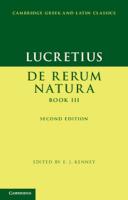
CUP (2014 [2nd ed.]) p/b 256pp £19.99 (ISBN 9780521173896)
The first edition appeared in 1971, since when there has been much work on Lucretius which K. summarises in a Supplementary Introduction, though with specific focus on Book 3. The introduction itself is for the most part unchanged (updates appear in three notes) but the section on the text has been completely rewritten and the apparatus criticus too has been revised.
The notes are now more copious and, to make room, less generously spaced. Headwords are no longer at the beginning of lines, but remain distinctive in bold (not all: 898 praesidium is sensibly removed as a headword, and included in the explanation of factis florentibus). In keeping with the style of the series, there is more help with translation, references to OLD are included in the vocabulary help, and grammatical explanation improved, though a thorough knowledge of basic syntax is assumed. Some notes are shortened—on torrat (917) discussion of the conjecture based on synizesis is omitted—and others left out—on pocula (913) the earlier comment (‘they are at the maudlin stage’) has been dropped. Some of the updating is to aid clarity, with reworked phraseology and reshaped sentences, though there is often new material, as in the note on O (first word) where ‘the sonorous interjection matches the emotional tone of the passage better than the prosaic (indeed superfluous) preposition …’ conveys the impact of the word more forcefully than before.
The first edition in its day was accessible as an A Level text and saw sterling service, but now, if Lucretius is set at AL again, editions such as John Godwin’s selections for BCP, are more likely to be used. For undergraduates, this is an ideal text offering a comprehensive study of the philosophy, the rhetoric, the genre and not least the poetry along with a modicum of help with the language. Anyone teaching Book 3, definitely needs the new edition at hand: even though K. worries that his revision may have lost the ‘brevity that comes close to wit’ (David West), his insights are still crisp, incisive and illuminating. A ‘must’ for all Lucretians and Epicureans.
Alan Beale
